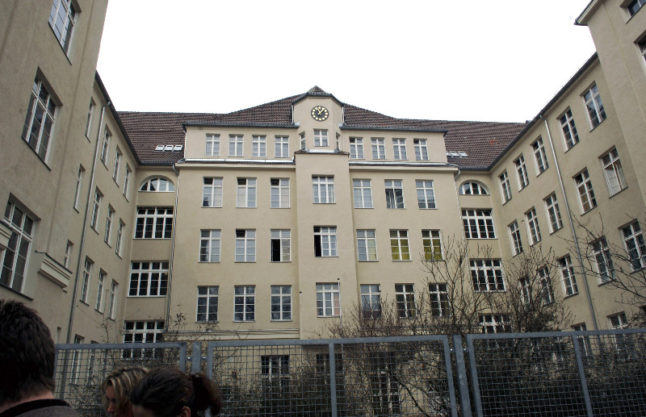The education ministries of Germany’s 16 states swiftly urged schools to “respond appropriately and sensitively” in the classrooms to the deadly attack by Hamas gunmen in Israel and the war it triggered.
Nowhere was the task more delicate for teachers than in Berlin’s Neukölln district, where a significant Arab community lives and where violent pro-Palestinian protests have erupted since the conflict began.
“A large number of our students are Muslim, many of Arab origin, and some of Palestinian origin,” said Clara Debour, a teacher at the district’s Rütli school.
On the Monday after Hamas gunmen stormed into Israel and killed at least 1,200 people, mostly civilians, according to Israeli authorities, the “students went through all kinds of emotions: fear, indignation, anger, sadness, and for some, a kind of satisfaction,” Debour said.
Close to the school, on Sonnenallee, a group called Samidoun distributed sweets to celebrate the attack in which about 240 people were also taken hostage.
The German government has since banned the organisation, with the interior minister saying it “spread anti-Israel and anti-Jewish propaganda under the guise of a ‘solidarity organisation’ for prisoners”.
At another school in the area, “many assumed that the attack was revenge that was deserved,” said a teacher, who spoke on condition of anonymity.
Tensions have continued to rise with the relentless Israeli bombardment of the Gaza Strip and subsequent ground invasion, which according to the Hamas-run health ministry has killed more than 11,100 people, most of them civilians.
‘Historical responsibility’
With the conflict ostensibly entering the schoolyards, the German government has ramped up its warnings over growing anti-Semitism and the urgency to address the issue in schools.
On Thursday, on the anniversary of the Nazi Kristallnacht pogrom that began the Holocaust, Chancellor Olaf Scholz urged schools to ensure they conveyed the sense of “historical responsibility” that Germany has towards Jews.
READ ALSO: ‘Never again’ is now: Scholz vows to protect country’s Jews
“It is an absolute necessity… for those who come from countries where the Holocaust is not talked about, or is talked about in a completely different way,” he said.
Kristallnacht, on November 9th-10th, 1938, was an outbreak of orchestrated violence that saw Jews murdered, synagogues torched and Jewish-owned businesses destroyed, and which ushered in the Nazis’s slaughter of six million European Jews during World War II.
After a fight broke out between a teacher and a student who had brought a Palestinian flag in to a school near Debour’s, Berlin has imposed a ban on “any demonstrative action or expression of opinion that can be understood as advocating or approving of the attacks against Israel”.
This includes the wearing of the Palestinian scarf or using stickers with slogans like “free Palestine”.
Berlin authorities have also distributed advice to schools in a letter on how to address the issue.
Three messages need to be conveyed to students during lessons on the conflict, it said: Israel has the right to defend itself, the fight against terrorism must be in line with international law, and Jews in Germany are not responsible for Israeli policy.
They are also offering training on how to broach the war in class, and about the ways in which young people gather information about it on social media.
“Adolescents are overwhelmed by the images they see. Many of their parents watch Al Jazeera, which shows more deaths than German television,” said Debour.
Many students understand Germany’s responsibility towards Jews but are angry at the government’s stance, which they believe is too close to Israel’s, she said.
The other teacher who spoke on condition of anonymity said that through discussions, the students were made to “understand that the repercussions would go against the well-being of all and that the distribution of sweets by Samidoun would benefit the German far right.”
Debour also voiced concern about the spread of misinformation, especially on TikTok, and seeks to debunk it in class.
Students may end up stuck “in their media bubble,” she said, adding that some “may risk radicalisation”.
By Céline Le Prioux




 Please whitelist us to continue reading.
Please whitelist us to continue reading.
Member comments